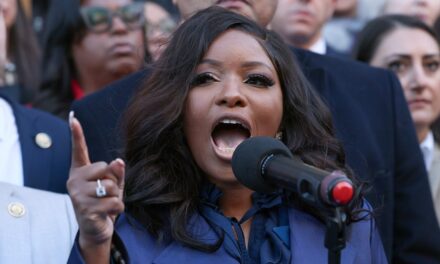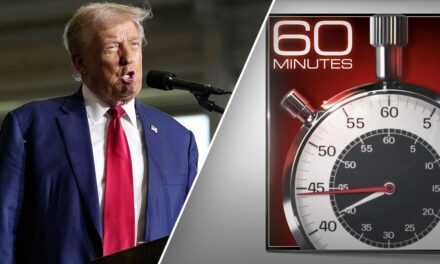In a recent rally, former President Donald Trump took the stage to deliver a blend of political commentary, personal reflections, and speculation about the current state of the White House under the Biden administration. One intriguing point of discussion was centered around Jill Biden’s role in her husband Joe Biden’s presidency, particularly whether she has become an ‘autopen’—a term Trump used to suggest that she might be taking on more responsibility than intended in the administration.
Trump’s rhetoric often aims to provoke conversation and controversy, and this instance was no exception. During his speech, he posed questions that resonated with his supporters, indicating his belief that Jill Biden has a significant influence over her husband’s decisions and the overall direction of the government.
The former president didn’t shy away from what some might categorize as a mockery of the situation. He pointedly said, “Is she really the one in charge? Is Joe still making all the decisions, or is it Jill running the show? Are we dealing with an autopen presidency?” This statement stirred the crowd, signaling Trump’s attempt to cast doubt on President Biden’s capability to lead independently.
The terminology Trump employed, particularly the concept of an “autopen,” is noteworthy. An autopen is a device that automatically reproduces signatures and can create the illusion of personal involvement without actual participation. Trump’s use of this metaphor suggested that he believes Jill Biden’s efforts may be overshadowing or overriding the president’s own leadership.
This line of inquiry certainly isn’t new in the realm of political discourse. Questions about the dynamics in a presidential marriage often arise, particularly when one or both of the individuals display behaviors that may indicate a powerful influence. Trump’s comments tap into deeper themes of gender dynamics, public perception, and the roles that First Ladies traditionally play in American politics.
Throughout history, First Ladies have often taken on various initiatives and issues during their spouses’ presidencies. From Eleanor Roosevelt’s activism on civil rights to Michelle Obama’s focus on health and education, the role can vary widely. However, always existing in the background has been a subtle power game where the influence of the First Lady can sometimes be questioned or mischaracterized.
While discussing Jill Biden, Trump also touched on broader criticisms of the Biden administration’s approach to governance. He criticized the effectiveness of the administration over its first three years, suggesting that many Americans feel disconnected from the leadership due to what he termed a loss of clarity and direction. To Trump, Biden’s leadership style, possibly filtered through Jill Biden’s perceptions or guidance, has led to this disconnect.
The dynamic between Joe and Jill Biden has been well-documented, with the couple often displaying a supportive and united front in public. However, Trump’s comments raise the question of whether their cooperative relationship might be perceived differently in the hyper-political context of the current news cycle.
Critics of Trump quickly pointed out that his comments could be interpreted as an attempt to undermine both Jill Biden’s agency and the legitimacy of Joe Biden as president. They argue that while political critiques are expected during rallies, suggesting that a woman’s agency in a professional relationship equates to an autopen dynamic is rooted in outdated and gendered tropes.
As political tensions continue to rise in the lead-up to the 2024 elections, speculation surrounding the presidential couple will likely remain a focal point. Trump’s comments may not solely reflect his views but also attempt to engage his base by questioning the fundamentals of Biden’s administration and leadership style. This strategy has been a hallmark of Trump’s approach, as he often prioritizes creating narratives that galvanize his supporters.
Additionally, Trump’s discussions about the Biden administration and its workings echo broader concerns regarding transparency and decision-making in leadership. Many Americans are looking for reassurance in their leaders, particularly during challenging times. As such, any implication that decision-making is not fully in the hands of elected officials stirs concern among citizens.
This aspect touches on a larger national dialogue about governance and efficacy. As Trump’s comments spark questions about the role of women in leadership, they also reflect public anxiety regarding president-to-citizen connections. The idea of someone else steering the political vehicle raises challenging questions about accountability and responsibilities within the highest office in the land.
In contrast, supporters of Joe Biden and Jill Biden have pushed back against these narratives, emphasizing the partnership between them as a source of strength. They argue that rather than being seen as a challenge to Joe Biden’s authority, Jill’s engagement in various issues is simply a natural continuation of her longstanding commitment to education, healthcare, and other causes. They assert that her influence serves as an asset to the administration rather than a detriment.
The interplay of these contrasting narratives offers a glimpse into the complexities of presidential House dynamics. As the political landscape continues to evolve, the discourse surrounding the personal and political roles of spouses in leadership will likely remain a focal point of media coverage and public conversation.
Ultimately, while Trump’s remarks about Jill Biden served as a device to draw attention to perceived weaknesses in the current administration, they also opened doors to more profound discussions about gender roles, power dynamics in political relationships, and the expectations of leadership in the United States. Whether these conversations will translate into actionable discourse or impact future elections remains to be seen, but they undoubtedly highlight the intricate connections between personal relationships and political power in American governance.
As the 2024 elections approach, the interplay of such narratives will continue to influence public opinion. Voter engagement driven by curiosity about leadership styles, the intersection of personal relationships, and the performance of elected officials is likely to shape upcoming political strategies. Furthermore, as citizens reflect on their choice of leadership, they will undoubtedly consider how personal dynamics and the abilities of spouses play a role in governance and the direction of the nation.
In conclusion, while Trump’s comments struck a dismissive note regarding Jill Biden’s influence, they ultimately touch on broader issues surrounding leadership, gender, and the personal dimensions of political life in America today. As politics remains ever-changing, the dialogue on the roles of both Joe and Jill Biden is far from over and will continue to shape the narrative leading into the next election cycle.
































